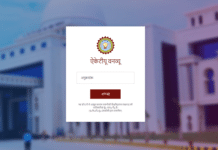The Science-Humanities divide, does it sound very familiar? The “Us” against “Them”, this binary is widely debated. Trapped in our areas of specialization with a sense of artificially created hierarchy, where are we heading? How does it change our mindset? Science students work with mathematical problems and tend to stay away from politics as it does not come within the ambit of their vocation. How far it is true? Even in humanities, we tend to talk a lot about western philosophy like Derrida and Foucault. What about regional novels or is there a dissemination of both the modes in our learning atmosphere? Let us demystify these questions. Sriram Narayanan, a student of Shiv Nadar University pursuing BSC in Biotechnology shares his views about it to our writer B.Geetha.
1. In our pedagogical system, there is a science-humanities divide. How do you think it brings a change in reading?
Sriram: I can’t state it as a general rule as each and every person is different and they have different ways of reading and interests. As a science student, I would definitely say that I get less to read many things apart from my course book. For me the only difference is perhaps in the frequency of reading books, which in my case is true. I personally feel that a humanities student gets more time to read and explore different genres as for a science student, it is a lot more difficult because we have to work in labs physically. The way of analysing and getting to know a particular novel is different. I think that a humanities student is more open minded when they tend to read and they do not have the tendency to always think logically like we science students do. We are so obsessed with facts that we forget to think from different perspectives. These are a few points which I feel are responsible in bringing the change in reading.
2. Since we all have our own area of specialization, how much do we traverse the world of reading?
Sriram: I would say I traverse a lot more than my fellow science students because I have always been fond of reading from a very young age, but in general my own area of specialization requires much more of my time, which does not allow me to read as much I want to. I have come across many science students say that reading anything apart from their course books is pointless. They feel why waste time in reading these things when they can excel without these distractions and are never willing to read books which are not from their field of work. I have tried my best to read as many genres as possible and I love William Shakespeare the best. Therefore, for me, area of specialization does not matter, only interest does.
3. As a Science student, how far are you interested in Politics?
Sriram: As a science student, I am very much interested in politics and tend to keep myself as updated as possible regarding the issues. For me, politics is a part of life and each and everyone needs to know about it. If you don’t follow politics you would not know of the current trends and would not be able to know what is happening around you. We have the right to vote which itself makes it necessary for us to know about various people involved in the making of our government and we can try and choose someone who we find is good for the country. Knowledge of politics is required because it affects the field in which you specialize in, either directly or indirectly.
4. Why is it that more importance is given to a Western mode of learning?
Sriram: The reason for giving more importance to a western mode of learning is due to the fact that it is in many ways a different way of learning and it has a more practical approach as compared to our system of education and the systems there are not rigid and allow innovation to a much larger extent. Our education can more easily frustrate people as there is a constant pressure of mugging things up. Western education gives us a more hands on approach which makes us learn things faster and it also helps us retain the knowledge longer and in a better way.
5. What do you think of Regional novels being a part of the curriculum, irrespective of the course?
Sriram: I think regional novels are an absolute necessity irrespective of the course because people tend to forget about their cultures and where they come from. I feel it might also make people read more as people, understand things better in their own native tongue and things are more easily relatable. People need to understand that they cannot let go of their culture.
6. How much do you think we step out of our complex syllabus and transform thought processes?
Sriram: Personally, I would say that we do not explore books out of our complex syllabus and transform our thought processes to a very large extent. The reason being that different areas of specialization require different set of skills and thought processes and therefore students only stick to them because frankly, many feel it is just too much hard work. They feel that transforming their thought processes will be a hindrance and thus will do more harm than good. The options in terms of books then become limited.
7. Who evolves more in terms of imaginative faculty, instead of completely following the esoteric methods? Humanities or Sciences? Why?
Sriram: I would definitely say Humanities. The reason for that would be the differences in thought process. For a science student, everything is either black or white, yes or no, present or not present. This is not very conducive for creative or imaginative thoughts and thus is a restriction, because we more or less need to follow particular methods and protocol. When it comes to a humanities student, nothing is ever black or white and thus they have to be creative and imaginative. Moreover, humanities students need to do everything on their own. They always need to put in their own perspectives as there is nothing like right or wrong, therefore a single thing can have many connotations and there are no particular correct or wrong methods to do so.
8. How do these centres of higher learning affect our choice of books?
Sriram: If you are a science student, you are more inclined towards genres like science fiction, mystery novels and so on and you definitely would not go towards classics because you have to think a lot and requires a different thought process, but a humanities student has the liberty to choose as many genres as possible and might enjoy all of them and will be able analyse them very differently from science students.
9. To end it on a lighter note, can you tell us about your favourite lines from any book?
Sriram: 1. “To be, or not to be: that is the question”. – Hamlet
2. “Men at some time are masters of their fates: The fault, dear Brutus, is not in our stars, but in ourselves, that we are underlings”. – Julius Caesar
3. “Science and religion are not at odds. Science is simply too young to understand.”
― Dan Brown, Angels & Demons
4. “Faith is universal. Our specific methods for understanding it are arbitrary. Some of us pray to Jesus, some of us go to Mecca; some of us study subatomic particles. In the end we are all just searching for truth, that which is greater than ourselves.”
― Dan Brown, Angels & Demons
5. “It takes a great deal of bravery to stand up to our enemies, but just as much to stand up to our friends.”
—Harry Potter and the Sorcerer’s Stone


















